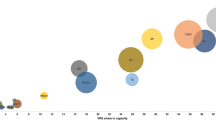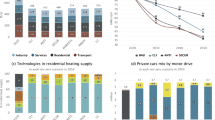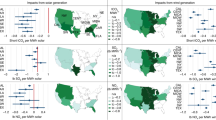Abstract
In many places, the electricity sector is transitioning towards greater share of renewable energy technologies. In the initial phase of the transition, a primary concern for research and policy was to establish renewables as technically and economically viable options. Today, the situation is different: renewables are diffusing rapidly in many electricity grids, thereby generating major changes for existing technologies, organizations and infrastructures. In this new phase of the energy transition, we do not just witness an acceleration of earlier transition dynamics, but also qualitatively new phenomena. These include a complex interaction of multiple technologies, the decline of established business models and technologies, intensified economic and political struggles of key actors such as utility companies and industry associations, and major challenges for the overall functioning and performance of the electricity sector (for example, when integrating renewables). Drawing on a transition studies perspective, this paper compares the two phases and discusses implications for research and policymaking.
This is a preview of subscription content, access via your institution
Access options
Access Nature and 54 other Nature Portfolio journals
Get Nature+, our best-value online-access subscription
$29.99 / 30 days
cancel any time
Subscribe to this journal
Receive 12 digital issues and online access to articles
$119.00 per year
only $9.92 per issue
Buy this article
- Purchase on Springer Link
- Instant access to full article PDF
Prices may be subject to local taxes which are calculated during checkout
Similar content being viewed by others
References
Mitchell, C. Momentum is increasing towards a flexible electricity system based on renewables. Nat. Energy 1, 15030 (2016).
Geels, F. W. et al. The enactment of socio-technical transition pathways: A reformulated typology and a comparative multi-level analysis of the German and UK low-carbon electricity transitions (1990-2014). Res. Pol. 45, 896–913 (2016).
Markard, J. & Hoffmann, V. H. Analysis of complementarities: Framework and examples from the energy transition. Technol. Forecast. Soc. 111, 63–75 (2016).
Markard, J., Raven, R. & Truffer, B. Sustainability Transitions: An emerging field of research and its prospects. Res. Pol. 41, 955–967 (2012).
Geels, F. W., Sovacool, B. K., Schwanen, T. & Sorrell, S. Sociotechnical transitions for deep decarbonization. Science 357, 1242–1244 (2017).
Smith, A., Voß, J.-P. & Grin, J. Innovation studies and sustainability transitions: The allure of the multi-level perspective and its challenges. Res. Pol. 39, 435–448 (2010).
Geels, F. W., Berkhout, F. & van Vuuren, D. P. Bridging analytical approaches for low-carbon transitions. Nat. Clim. Change 6, 576 (2016).
Kern, F. & Markard, J. in The Palgrave Handbook of the International Political Economy of Energy (eds Van de Graf, T. et al.) Ch. 12, 291–318 (Palgrave Macmillan UK, London, 2016).
Stirling, A. Transforming power: Social science and the politics of energy choices. Energy Res. Soc. Sci 1, 83–95 (2014).
Rittel, H. W. J. & Webber, M. M. Dilemmas in a general theory of planning. Pol. Sci. 4, 155–169 (1973).
Mowery, D. C., Nelson, R. R. & Martin, B. R. Technology policy and global warming: Why new policy models are needed (or why putting new wine in old bottles won't work). Res. Pol. 39, 1011–1023 (2010).
Shove, E. & Walker, G. CAUTION! Transitions ahead: politics, practice and sustainable transition management. Environ. Planning A 39, 763–770 (2007).
Garud, R., Gehman, J. & Karnoe, P. in Research in the Sociology of Work: Institutions and Entrepreneurship Vol. 21 (eds Sine, W. D. & David, R.) 51–93 (Emerald Group Publishing Ltd, Bingley, 2010).
Rosenbloom, D., Berton, H. & Meadowcroft, J. Framing the sun: A discursive approach to understanding multi-dimensional interactions within socio-technical transitions through the case of solar electricity in Ontario, Canada. Res. Pol. 45, 1275–1290 (2016).
Bergek, A. et al. Technological innovation systems in contexts: Conceptualizing contextual structures and interaction dynamics. Environ. Innov. Soc. Trans. 16, 51–64 (2015).
Coenen, L., Benneworth, P. & Truffer, B. Towards a spatial perspective on sustainability transitions. Res. Pol. 41, 968–979 (2012).
Grubler, A. Energy transitions research: Insights and cautionary tales. Energy Policy 50, 8–16 (2012).
van den Bergh, J. C. J. M. Policies to enhance economic feasibility of a sustainable energy transition. Proc. Natl Acad. Sci. USA 110, 2436–2437 (2013).
Rotmans, J., Kemp, R. & van Asselt, M. More evolution than revolution. Transition management in public policy. Foresight 3, 15–31 (2001).
Raven, R. Niche accumulation and hybridisation strategies in transition processes towards a sustainable energy system: An assessment of differences and pitfalls. Energy Policy 35, 2390–2400 (2007).
Musiolik, J., Markard, J. & Hekkert, M. Networks and network resources in technological innovation systems: Towards a conceptual framework for system building. Technol. Forecast. Soc. 79, 1032–1048 (2012).
Stenzel, T. & Frenzel, A. Regulating technological change—The strategic reactions of utility companies towards subsidy policies in the German, Spanish and UK electricity markets. Energy Policy. 36, 2645–2657 (2008).
van Lente, H. & Bakker, S. Competing expectations: the case of hydrogen storage technologies. Technol. Anal. Strat. Manage. 22, 693–709 (2010).
Global Wind Report 2015 - Annual market update (Global Wind Energy Council, Brussels, 2016).
Snapshot of Global Photovoltaics Markets (International Energy Agency, 2017).
Kungl, G. Stewards or sticklers for change? Incumbent energy providers and the politics of the German energy transition. Energy Res. Soc. Sci. 8, 13–23 (2015).
Lauber, V. & Jacobsson, S. The politics and economics of constructing, contesting and restricting socio-political space for renewables - The German Renewable Energy Act. Environ. Innov. Soc. Trans. 18, 147–163 (2016).
Bird, L., Milligan, M. & Lew, D. Integrating Variable Renewable Energy: Challenges and Solutions. (National Renewable Energy Laboratory, Golden, Colorado, 2013).
Sutherland, L.-A., Peter, S. & Zagata, L. Conceptualising multi-regime interactions: The role of the agriculture sector in renewable energy transitions. Res. Pol. 44, 1543–1554 (2015).
Erlinghagen, S. & Markard, J. Smart grids and the transformation of the electricity sector: ICT firms as potential catalysts for sectoral change. Energy Policy 51, 895–906 (2012).
Dijk, M., Wells, P. & Kemp, R. Will the momentum of the electric car last? Testing an hypothesis on disruptive innovation. Technol. Forecast. Soc. 105, 77–88 (2016).
Rosenbloom, D. Pathways: An emerging concept for the theory and governance of low-carbon transitions. Glob. Environ. Chang. 43, 37–50 (2017).
Sandén, B. A. & Hillman, K. M. A framework for analysis of multi-mode interaction among technologies with examples from the history of alternative transport fuels in Sweden. Res. Pol. 40, 403–414 (2011).
Stephan, A., Schmidt, T. S., Bening, C. R. & Hoffmann, V. H. The sectoral configuration of technological innovation systems: Patterns of knowledge development and diffusion in the lithium-ion battery technology in Japan. Res. Pol. 46, 709–723 (2017).
Lamberg, J.-A., Ojala, J. & Peltoniemi, M. Thinking about industry decline: A qualitative meta-analysis and future research directions. Bus. Hist. 60, 127–156 (2018).
Turnheim, B. & Geels, F. W. Regime destabilisation as the flipside of energy transitions: Lessons from the history of the British coal industry (1913–1997). Energy Policy 50, 35–49 (2012).
Hess, D. J. Sustainability transitions: A political coalition perspective. Res. Pol. 43, 278–283 (2014).
Markard, J., Suter, M. & Ingold, K. Socio-technical transitions and policy change – Advocacy coalitions in Swiss energy policy. Environ. Innov. Soc. Trans. 18, 215–237 (2016).
Voß, J.-P., Bauknecht, D. & Kemp, R. Reflexive Governance for Sustainable Development (Edward Elgar, Cheltenham, 2006).
Stirling, A. Pluralising progress: From integrative transitions to transformative diversity. Environ. Innov. Soc. Trans. 1, 82–88 (2011).
Jacobsson, S. & Bergek, A. Innovation system analyses and sustainability transitions: Contributions and suggestions for research. Environ. Innov. Soc. Trans. 1, 41–57 (2011).
Kivimaa, P. & Kern, F. Creative destruction or mere niche support? Innovation policy mixes for sustainability transitions. Res. Pol. 45, 205–217 (2016).
Rogge, K. S. & Reichardt, K. Policy mixes for sustainability transitions: An extended concept and framework for analysis. Res. Pol. 45, 1620–1635 (2016).
Stegmaier, P., Kuhlmann, S. & Visser, V. R. in The Governance of Socio-Technical Systems (eds Borrás, S. & Edler, J.) Ch. 6, 111–131 (Edward Elgar, Cheltenham, 2014).
Stirling, A. Transforming power: Social science and the politics of energy choices. Energy Res. Soc. Sci. 1, 83–95 (2014).
Sovacool, B. K. How long will it take? Conceptualizing the temporal dynamics of energy transitions. Energy Res. Soc. Sci. 13, 202–215 (2016).
Binz, C. & Truffer, B. Global Innovation Systems—A conceptual framework for innovation dynamics in transnational contexts. Res. Pol. 46, 1284–1298 (2017).
Electricity Information 2017. III–157, 213, 462, 517 (IEA, 2017).
Electric Generation Capacity & Energy (California Energy Commission, accessed 12 April 2018); http://www.energy.ca.gov/almanac/electricity_data/electric_generation_capacity.html
Stromerzeugung nach Energieträgern 1990-2017 (accessed 12 April 2018); https://ag-energiebilanzen.de/
Acknowledgements
This research has received funding from the Research Council of Norway (Energix program, Project ‘Integration of Power Transmission Grids’, grant no. 243994) and it is also part of the activities of the Swiss Competence Center for Energy Research (SCCER CREST), financially supported by Innosuisse under grant no. KTI 1155000154. I thank V. Hoffmann, A. D. Andersen, B. Girod, F. Kern, C. Knoeri, M. Schwartz and B. Turnheim for their comments.
Author information
Authors and Affiliations
Corresponding author
Ethics declarations
Competing interests
The author declares no competing interests.
Additional information
Publisher’s note: Springer Nature remains neutral with regard to jurisdictional claims in published maps and institutional affiliations.
Rights and permissions
About this article
Cite this article
Markard, J. The next phase of the energy transition and its implications for research and policy. Nat Energy 3, 628–633 (2018). https://doi.org/10.1038/s41560-018-0171-7
Received:
Accepted:
Published:
Issue Date:
DOI: https://doi.org/10.1038/s41560-018-0171-7
This article is cited by
-
A balancing act: radicality and capture in institutionalising reflexive governance for urban sustainability transitions
Urban Transformations (2024)
-
Collective action lessons for the energy transition: learning from social movements of the past
Sustainability Science (2024)
-
Phasing-out ‘coal tradition’ in favour of ‘renewable colonialism’: how the press contributes to the discursive (de)legitimization of coal and renewables in a coal region in transition
Sustainability Science (2024)
-
The role of Green Public Procurements in energy transition: the case of Western Macedonia
Journal of Innovation and Entrepreneurship (2023)
-
CarbonMonitor-Power near-real-time monitoring of global power generation on hourly to daily scales
Scientific Data (2023)



